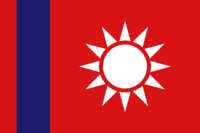Monsilvan Army
| Monsilvan Army | |
|---|---|
 Emblem of the Monsilvan Army | |
| Founded |
|
| Country | |
| Type | Army |
| Size |
|
| Part of | Monsilvan Armed Forces |
| Motto(s) | "知可战与不可战者胜" "He who knows when he can fight and when he cannot will be victorious" |
| Colors | Green Dark blue Red White |
| Commanders | |
| Commander of the Army | General Kong Gui-ren |
| Deputy Commander | Lieutenant-General Duan Jian Lieutenant-General Luó Hong |
| Chief of Staff | Lieutenant-General Song Bo |
| Insignia | |
| Flag |  |
The Monsilvan Army is the principal land warfare force of the Monsilvan Armed Forces. As of 2023, the Monsilvan Army comprises of 172,600 personnel, including 6,358 Mutongs. The modern Monsilvan Army traces back to 1730 with the formation of the Imperial Shan Army, tasked to defend the Kingdom of Great Shan after it gained independence from the Empire of Baltanla. The term "Monsilvan Army", however, was not used until 1830, with the foundation of the Kingdom of Monsilva and the Monsilvan Royal Army.
During the martial law period in Monsilva, the Monsilvan Army served as the principal policing force for the nation. During this period, the army's reputation amongst the people of Monsilva became increasingly negative due to the extreme levels of oppression and violence committed by the army. The army frequently clashed with civilians during protests and riots during the late 1970s, the most noticeable of which being the 1978 Jingtianmen massacre.
Since the establishment of the Monsilvan Republic in 1978, the army was re-named to the "Monsilvan Army" and its roles as a police force were revoked. A large amount of senior and junior members of the Royal Army during the martial law period were imprisoned or executed for the crimes they committed whilst serving as the police force. Major reforms took place within the Army during the 1980s and 1990s which have returned its previously positive reputation.